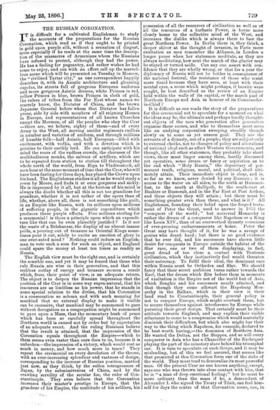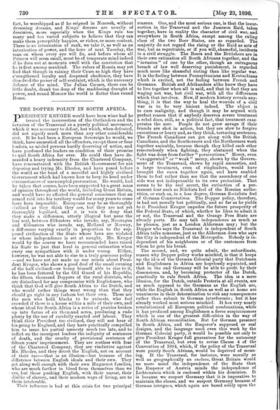THE RUSSIAN CORONATION.
IT is difficult for a cultivated Englishman to study the accounts of the preparations for the Russian Coronation, which read as if they ought to be printed in gold upon purple silk, without a sensation of disgust, more especially if he reads at the same time the descrip- tion of the massacres of Armenians whom the Russians have refused to protect, although they had the power. He has a. feeling for pageantry, and rather wishes he had some to enjoy, and can with an effort call up the marvel- lous scene which will be presented on Tuesday in Moscow, the "civilised Tartar city," as one correspondent happily describes it, with its Asiatic architecture and gleaming cupolas, its streets full of gorgeous European uniforms and more gorgeous Asiatic dresses, white Princes in red, yellow Princes in blue, brown Princes in cloth of gold, the rulers of tribes from the Far East whose names we scarcely know, the Dictator of China, and the brown Japanese General before whom that Dictator has fallen prone, side by side with members of all reigning Houses in Europe, and representatives of all known Churches except the Mormon, of all the peoples who obey the Czar —there are, we believe, eighty of them—and of every Army in the West, all moving amidst regiments endless in number and varieties of uniform, and through millions of humble folk—half Asiatic, half European—filled with excitement, with vodka, and with a devotion which is genuine to their earthly lord. He can anticipate with his mind the roars of the endless crowds, the choruses of the multitudinous monks, the salvoes of artillery, which are to be repeated from station to station till throughout the whole north of the world, from Riga to Vladivostock, all men hear at the same moment of time that the Czar, who will have been fasting for three days, has placed the Crown upon his head. The Englishman studies it all as he would study a poem by Moore, and finds it at once gorgeous and sickly. He is impressed by it all, but at the bottom of his mind is always the doubt whether all this is not too grandiose for grandeur, whether it is not rather of the opera than of life, whether, above all, there is not something like guilt, in an Empire like Russia, with its millions upon millions of suffering people, in the gigantic expenditure which produces these purple effects. Five millions sterling for a ceremonial ! is there a principle upon which an expendi- ture like that can be even plausibly justified ? Is it not the waste of a Belshazzar, the display of an almost insane pride, a pouring out of treasure as Oriental Kings some- times pour it out, solely to excite an emotion of glory in one over-sated mind ? Nothing could induce an English- man to vote such a sum for such an object, and England could spare the money at least ten times as readily as Russia.
The English view must be the right one, and is certainly the sensible one, and yet it may be feared that those who rule Russia are wise in their generation, and that this reckless outlay of energy and treasure secures a result which, from their point of view, is an adequate return. The object is to deepen the Russian impression that the position of the Czar is in some way supra-natural, that his resources are as limitless as his power, that he stands in some special relation to the divine, that his Coronation is a consecration so solemn and with such meaning for mankind that no external display to make it visible can be excessive, that mankind may be summoned to gaze without derogation as a congregation might be summoned to gaze upon a Mass, that the momentary hush of peace which has been so carefully spread throughout the Northern world is caused not by order but by expectation of an adequate event. And the ruling Russians believe that the result is attained, that the impression of the Coronation equals throughout the Empire—which to them seems even vaster than ours does to us, because it is unbroken—the impression of a victory, which would cost as much in money, and how much more in tears ? They repeat the ceremonial on every devolution of the throne, with an ever-increasing splendour and vastness of design, corresponding to the increase of Russian position, marked just now, as they think, by the sullen retrogression of Japan, by the submissiveness of China, and by the crawling servility of the secular foe, the ruler of Con- stantinople. They even believe that the Coronation increases their master's prestige in Europe, that the grandeur of his Empire, the multitude of his soldiers, his possession of all the resources of civilisation as well as or all the resources of a barbaric Power, is borne more closely home to the collective mind of the West, and increases the dislike which is always there to face the great Northern Power. In Berlin there is, they think, a deeper shiver at the thought of invasion, in Paris more exultation as men remember the Alliance, in London a longer pause when her statesmen meditate, as they are always meditating, how next the march of the glacier may be stayed or turned aside. Can any one assert with con- fidence that they are wholly wrong, or that for a year the diplomacy of Russia will not be bolder in consequence of the national festival, the resistance of those who resist more timid because they have seen, at least with their mental eyes, a scene which might perhaps, if brevity were sought, be best described as the review of an Empire held within the walls of its capital, or the march past of Northern Europe and Asia in honour of its Commander- in-Chief ?
It is difficult as one reads the story of the preparations for this ceremonial not to speculate for a moment on what the ideas may be, the ultimate and perhaps hardly thought- out objects of the men who generation after generation organise these scenes, and who to themselves must seem like an undying corporation sweeping steadily though slowly on to some as yet unseen goal. They are the- servants of a dynasty, not of a people; they are subject only to external checks, not to changes of policy and alterations of national ideal such as affect Western Governments; and though, like all other statesmen, they probably take short views, there must linger among them, hardly discussed yet operative, some dream or fancy or aspiration as to the end which "Holy Russia," the depositary of per- manent truth, religious, moral, and political, shall ulti- mately attain. Their immediate object is clear, and is, so far as we know, never denied by any Russian ; it is access to the water on all sides, to the north at Hammer. feat, to the south at Gallipoli, to the south-east at Bushire or Bussorah, and in the Far East at Port Arthur, and these objects they will attain ; but there must be something greater even than these, and what is it. ? All Englishmen, founding their belief upon the forged testa- ment of Peter the Great, used to answer in 1855 the "conquest of the world ; " but universal Monarchy is rather the dream of a conqueror like Napoleon or a King like Louis XIV., than of an overworked dynasty conscious. of ever-pressing embarrassments at home. Peter the Great may have thought of it, for he was a savage of genius who drank hard ; but there is no good evidence that he ever did, and his successors have shown little desire for conquests in Europe outside the habitat of the. Slav race, one or two of them displaying, in fact, great dread of too close a contact with Teutonic civilisation, which they instinctively feel would threaten their autocracy. To fulfil their ideal, the dominant race within Russia must be Orthodox and Slay. We should fancy that their secret ambition turns rather towards the East, that the dream which flits before them in moments of exaltation is the Empire not of the world but of Asia, which Zenghiz and his successors nearly attained, and that though they come athwart the Hapsburg Mon- archy in the Balkan, which in their view is their land road to Constantinople, their general policy is not to conquer Europe, which might overtask them, but to secure themselves against interference by Europe while pursuing their great design. That certainly must be their attitude towards England, and may explain their visible- reluctance to come to a compromise which would materially diminish their difficulties, but which also might bar their way to the thing which Napoleon, for example, declared to be best worth having,—the dominion of Southern Asia. He wanted the Deltas, not the Steppes, and so will every conqueror in Asia who has a. Chancellor of the Exchequer playing the part of the minatory slave behind his triumphal car. It is vain to speculate on such things, and it may be. misleading, but of this we feel assured, that scenes like that presented at this Coronation form one of the risks of the world. They must tend to demoralise its most powerful man. Of the present Czar no one knows anything, except, says one who was thrown into close contact with him, that he is "a man of deep emotional feeling;" but he must be • more ordinary than the mass if he, a descendant of Alexander I. who signed the Treaty of Tilsit, can feel him- self for days the centre of that Coronation scene, can, in fact, be worshipped as if he reigned in Nineveh, without dreaming dreams, and Kings' dreams are usually of dominion, more especially when the Kings rule too many and too varied subjects to believe that they can make them perceptibly happier, or richer, or more content. There is an intoxication of rank, we take it, as well as an intoxication of power, and the hero of next Tuesday, the man on whom every eye will fix, and before whom all Princes will seem small, must be of temperate mind indeed if he does not at moments swell with the conviction that he is first among mankind. The rulers of Russia may yet find that though in raising their Czars so high they have rerengthened loyalty and deepened obedience, they have dissolved the power of self-restraint, which is the necessary defence of the mind. The Julian Cresars, there can be little doubt, drank too deep of the maddening draught of power, and round Moscow the world is flatter than round Rome.



































 Previous page
Previous page